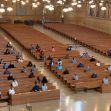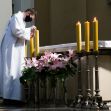Late last Wednesday, the U.S. Supreme Court voted in a narrow decision of 5-4 blocking the governor of New York, Andrew Cuomo, from strictly limiting the number of people congregating in areas of worship, including churches and synagogues. The governor of New York implemented these restrictive measures after the state began seeing an uptick of coronavirus cases.
The order that was enacted by the governor applied to "red" and "orange" hot spot zones. The order stipulated that areas of worship could not have more than ten people in attendance if the institution was located in a red zone. However, essential businesses have been allowed to admit individuals freely without limitations in red zones.
In orange zones, where outbreaks are slightly less but still concerning, religious institutions can permit up to 25 people. In orange zones, both essential and non-essential businesses have been allowed to use their discretion regarding how many people may enter their facilities.
The limitations on gatherings only apply to religious institutions and do not include small businesses and restaurants. Essential businesses are still allowed to offer services and freely accept individuals.
The U.S. Supreme Court ruled that the order was not neutral or equal because it singled out places of worship. The Supreme Court also identified that places of worship were under stricter treatment according to the state even though places of worship have not been the primary source of the virus spreading.
The majority of the Supreme Court justices ruled in favor of an emergency and temporary stay of execution order against the limitations placed on houses of worship. The courts determined that the plaintiffs’ religious institutions, the Roman Catholic Diocese of Brooklyn and Agudath Israel of America, would succeed once the case is fully litigated completely because the case fell under the legal standard of strict scrutiny.
How Did the Supreme Court Vote?
The Supreme Court decision was issued as a per curium opinion. This means that it was not signed by any one justice. Rather, Justices Brett Kavanaugh and Neil Gorsuch have shared their own points of view, clarifying how they would vote on the issue.
Justices Sonia Sotomayor, Elena Kagan, and Stephen Bryer all opposed expressing that Governor Cuomo has sufficient power to respond in the way he has because the nation is in a global pandemic. Finally, Chief Justice John Roberts dissented and clarified that the temporary relief was no longer necessary because none of the houses of worship in question were in a "red zone."
National Debate Over Religious In-Person Services During the Pandemic
Governor Cuomo's order that singles out religious institutions is not the first of its kind in the nation. Through the pandemic, especially during the earlier months, several states wrestled with the idea of limiting or prohibiting in-person religious services.
In late April, at the start of the pandemic, a federal judge blocked the state of Kansas from limiting attendance at religious institutions. Kansas initially stipulated that only ten or fewer people were allowed to attend in-person services. However, a federal judge ruled that this was a violation of First Amendment Rights.
In the same month, a similar ruling was had in regard to a Mississippi church and its drive-in services. The city of Grenville barred religious institutions from holding services, including drive-in and in-person services, by issuing an "Executive Order Regarding Church Services." One particular church continued with drive-in services that resulted in $500 fines for those who broke the executive order and attended.
Backed by the Department of Justice with a 14-page statement of interest and by Attorney General William Barr in his own statement, the church filed a suit against the city. In the suit, the church stipulated that violation of First Amendment rights took place as well as the violation of the Mississippi Religious Freedom Restoration Act.






